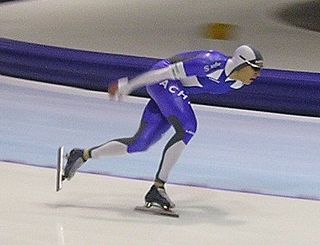The World Allround Speed Skating Championships are a series of speed skating events held annually to determine the best allround speed skater of the world. The event is held over two days, with all skaters entering the first three distances and the best eight skaters over these distances getting to ride the last event. The results of the races are converted to points, and the skater with lowest total score wins the championship.

Adrianus "Ard" Schenk is a former speed skater from the Netherlands, who is considered to be one of the best in history. His first Olympic success came in 1968, when he won a silver medal at the 1968 Winter Olympics. Between 1970 and 1972 Winter Olympics, Schenk won three consecutive World Allround Speed Skating Championships. He won three gold medals at the 1972 Winter Olympics, becoming, along with Galina Kulakova of Soviet Union, the most successful athlete there.

Yevgeny Romanovich Grishin was a Soviet and Russian speedskater. Grishin trained for the largest part of his speedskating career at CSKA Moscow. A four-time Olympian, he became European Champion in 1956, and won Olympic gold in the 500 meter and 1500 meter events in both 1956 and 1960 Winter Olympics, competing for the USSR team. Along with his compatriot Lidiya Skoblikova, he was the most successful athlete at the 1960 Winter Olympics.
Speed skating at the 1968 Winter Olympics, was held from 4 to 12 February. Eight events were contested at L'Anneau de Vitesse in Grenoble, France.

Egbert Rolf "Erben" Wennemars is a Dutch former speed skater. He specialized in the sprint and middle distances of 500, 1000 and 1500 meters, and set six world records during his career.

Ihar Mikalaevich Zhalyazouski or Igor Nikolayevich Zhelezovski or Ihar Mikałajevič Žalazoŭski was a Soviet and Belarusian speed skater.

Tatyana Borisovna Averina was a Soviet Russian speed skater. After getting married, her name also appeared as Tatyana Barabash.

Hendrik ("Henk") van der Grift is a retired Dutch speed skater.

Yuri Matveyevich Mikhaylov was a speed skater who competed for the Soviet Union.

Erling Martin Jonny Nilsson was a Swedish competitive speed skater. He was the men's Olympic champion in the 10 000 m skating in 1964.

Lyudmila Yevgenyevna Titova is a retired Russian speed skater.

Pekka Koskela is a retired Finnish speed skater, specialised on the sprint distances 500 m and 1000 m. He is the former world record holder on the 1000 m with the time 1:07.00. In December 2001 he set a junior world record on the 500 m with the time 35.89. Since that time he has established himself as one of the best speed skating sprinters in the world. He won his first medal, a bronze, on the 1000 m in the 2005 World Single Distance Championships. Koskela was number 10 in the 500 m of the 2006 Winter Olympics.

Leo Ensio Linkovesi was a Finnish speedskater who specialised on the shorter distances, the 500 m and the 1000 m.
Kevin Overland, or Kevin Crockett is a Canadian former Olympic and ISU Speed Skating World Cup medallist and present-day Speed Skating Canada national sprint team coach. He won the Olympic bronze medal in the 500 metres event at the 1998 Winter Olympics. Crockett also set two world records during his career as a skater.

Stefan Groothuis is a Dutch retired speed skater. He is the World Sprint Champion for 2012 and the gold medal winner in the 1000 metres at the 2014 Winter Olympics.

Henricus Coenradus Nicolaas "Hein" Vergeer is a Dutch former speed skater who became both European and World Allround Champion in both 1985 and 1986 . Hein Vergeer was a dominant allround skater, but after recovering from an injury, he was never able to reach that same level again. Because of this, he was unable to fulfil his wish of winning an Olympic medal – at the 1988 Winter Olympics in Calgary, Vergeer competed in the 500 m, the 1,000 m, and the 1,500 m, but his best result was a mere fifteenth place. He had also competed in those same three distances at the Winter Olympics in Sarajevo four years earlier, but did not do much better than with a tenth place as his best result. His best years were in between those two Winter Olympics.
Roald Morel Larsen was a World Champion speed skater from Norway. He was born in Kristiania . Roald Larsen's parents were Hans Jacob Larsen, a glazier born in Kristiania in 1870, and Lydia Larsen, born in Porsgrunn in 1865. They had four children, all sons: Jaan Harald (1891), Lyder Ragnar (1895), Roald Morel (1898), and Gelgjermo Stone (1899).

Monika Pflug, also known as Monika Holzner-Pflug and Monika Gawenus-Pflug, is a German former speed skater. She was born in Munich and competed for West Germany.

Nao Kodaira is a Japanese former long track speed skater who specialised in the sprint distances.
Sylke Luding is a former East German long track speed skater, who was active between 1982 and 1991. She was a member of SC Einheit Dresden and the East Germany national sprint team and represented her nation at international competitions.


















